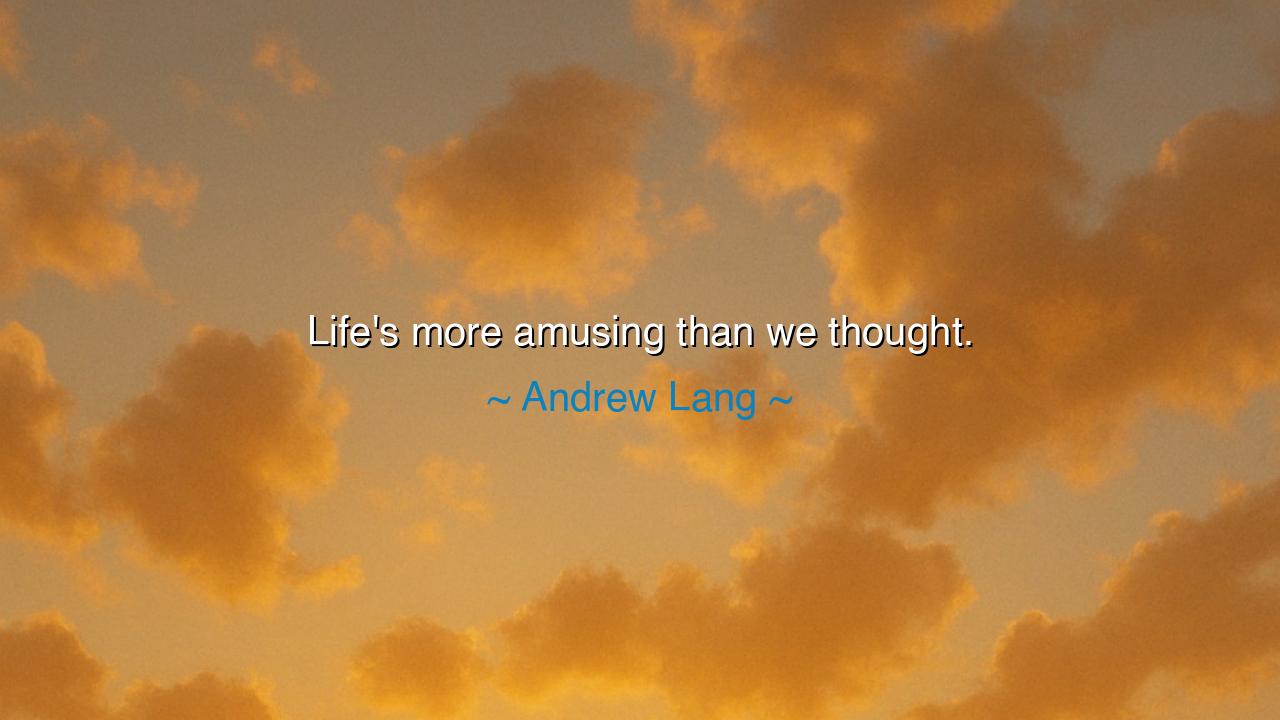
Life's more amusing than we thought.






In the gentle irony of his wit, Andrew Lang once observed: “Life’s more amusing than we thought.” These few words, light as laughter and deep as truth, carry the wisdom of one who looked upon the world not with bitterness, but with wonder. Beneath their playfulness lies a revelation: that life, for all its struggle and sorrow, has within it a secret rhythm of humor, surprise, and grace. Lang, a poet and folklorist of the late nineteenth century, spent his days gathering stories from the hearts of many cultures — tales of heroes, fools, and dreamers. Through them, he saw that the world is not merely a tragedy to be endured, but a grand and unpredictable theater where beauty and absurdity intertwine.
To say that life is amusing is not to dismiss its pain, but to recognize its paradox. Every sorrow carries a spark of light; every failure hides a hidden jest of destiny. Lang’s words arise from the same spirit that moves through the laughter of wise men — the laughter that comes not from mockery, but from comprehension. For when one begins to see the great tapestry of existence, one understands that joy and sorrow are threads woven by the same hand. What seems cruel one day may, in time, reveal a hidden kindness. What appears foolish now may later show the wisdom of divine humor. Thus, the wise learn to smile at life — not in denial, but in reverence.
Consider the story of Socrates, who, when condemned to death by his city, drank the cup of poison with calm and wit. Even as the hemlock numbed his body, he spoke gently to his friends, reminding them that no man truly knows what awaits beyond death — perhaps a long and peaceful sleep, or perhaps a new beginning. His humor in the face of mortality was not madness; it was wisdom. Socrates understood that to live well, one must accept that the universe is not built solely for our comfort or control. In embracing this uncertainty, he discovered a freedom that few ever taste — the freedom to find amusement in existence itself, even when the curtain begins to fall.
So too, Andrew Lang’s quote is a reminder to look at the world with eyes unclouded by despair. He, who collected the ancient fairy tales of the world, knew that life’s plot twists are often stranger — and kinder — than we can imagine. In fairy tales, as in life, the hero stumbles into danger only to find aid in unexpected forms: an old woman, a talking beast, a forgotten friend. These stories mirror reality more than we realize. Life, in its quiet mischief, delights in surprising us — turning our misfortunes into lessons, our tears into laughter, and our struggles into songs. Life’s amusement is divine in origin, for it reflects the boundless creativity of the universe itself.
But how rarely we notice this, wrapped as we are in worry and pride. We mistake seriousness for strength, and forget that laughter is a form of courage. The one who can laugh at life has already begun to conquer it. For humor is the soul’s rebellion against despair — a declaration that meaning can still be found even in the absurd. The fool who laughs in hardship is often wiser than the philosopher who scowls at fate. Lang’s words call us back to that ancient wisdom: that to live well is to play well, to dance with fate rather than fight it, and to marvel that the world remains, despite everything, wondrous and strange.
Reflect also upon the life of Charles Darwin, who, after decades of study, discovered that life itself — the crawling, climbing, blooming web of creation — evolves through chance and struggle. To some, his findings were grave and godless; to others, they revealed the astonishing humor of existence. For what else but divine playfulness could design such variety — from the beauty of a peacock’s tail to the clumsiness of a penguin’s waddle? Darwin himself wrote with awe, not despair, knowing that creation, though fierce and flawed, was filled with endless creativity. His science, like Lang’s laughter, whispered the same truth: life is not a rigid tragedy — it is a living comedy, still being written.
So, my children, take this teaching into your hearts: do not be too solemn about your existence. Laugh, even when life tests you, for laughter is an act of faith. See yourself not as the victim of fate, but as its companion in a great and unpredictable game. Find amusement in your missteps, beauty in your burdens, and wonder in your weariness. When the world confuses you, remember Lang’s quiet smile and his gentle wisdom — that life, when looked at closely enough, is always more amusing, more miraculous, and more mysterious than we first believed.
For in the end, to live is to marvel, and to marvel is to love. And when you learn to laugh not out of mockery, but out of understanding — when you can smile at the absurdity and grace of being human — then you will have discovered what Lang knew so well: that life’s greatest secret is its playfulness, and that in every joy and sorrow, the universe itself is smiling back at you.






AAdministratorAdministrator
Welcome, honored guests. Please leave a comment, we will respond soon